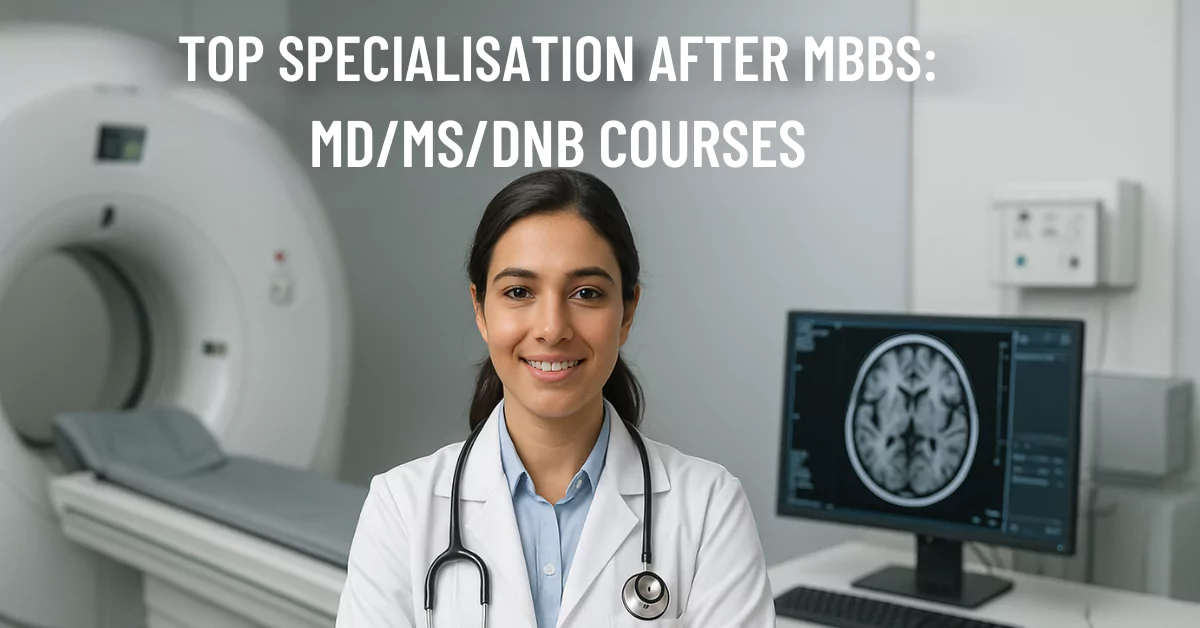Top Specialisation After MBBS: Once medical students complete their MBBS degree, the next crucial decision in their medical career is choosing the right specialisation. This not only determines future work environment and patient base but also shapes career prospects, earning potential, and personal fulfilment.
With the evolving landscape of healthcare, specialisation has become more important than ever. It allows doctors to gain in-depth expertise, manage complex medical cases, and contribute more effectively to patient care and medical research.
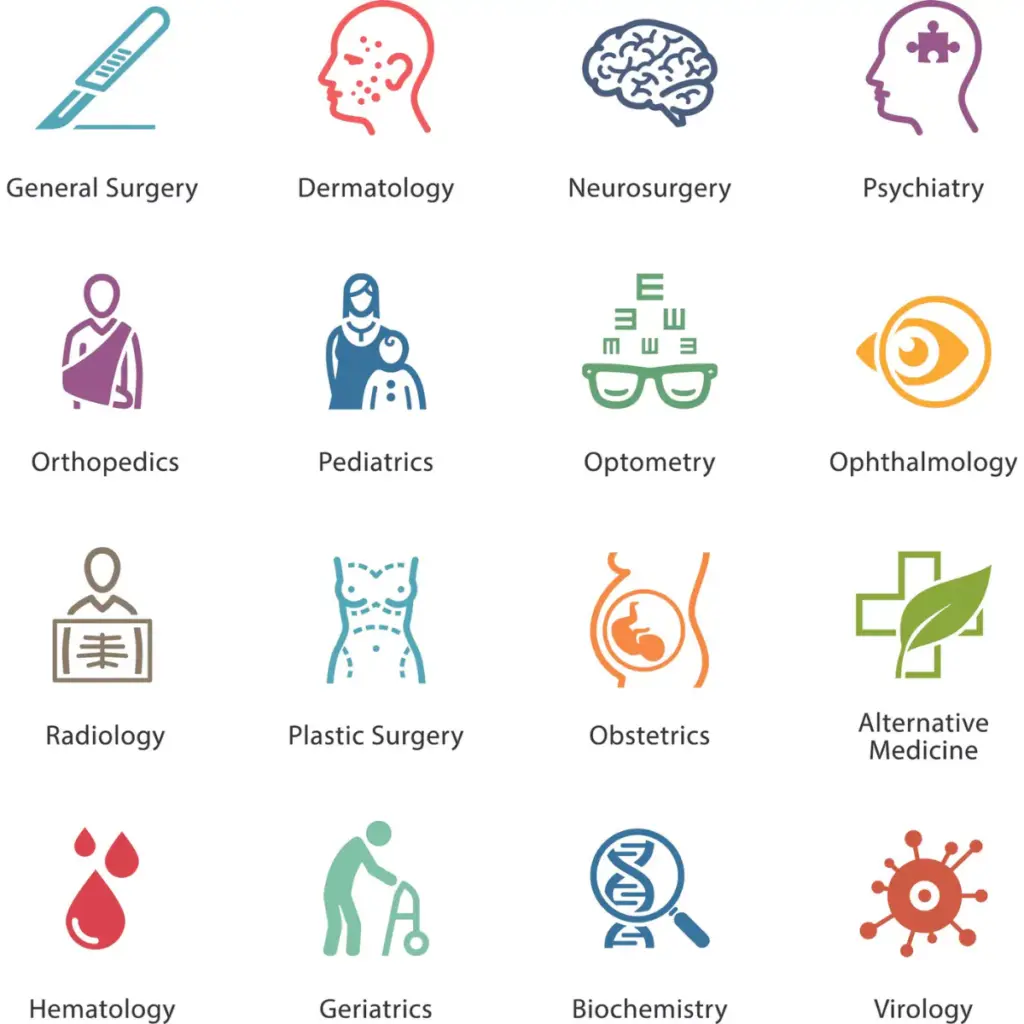
In this article, we provide a comprehensive overview of the top MBBS specialisations in India, including what each entails and why choosing a specialisation is a strategic and rewarding step for aspiring doctors.
MBBS Specialisation Highlights
| Criteria | Details |
| Total MBBS Specialisations | 20+ (clinical + non-clinical) |
| Top Demand Specialisations | Cardiology, Paediatrics, Orthopaedics, OB-GYN |
| Average PG Duration | 3 years |
| Career Scope | Hospitals, Clinics, Research, Education |
| Loan Support | Propelld, HDFC Credila, SBI Education Loans |
Why Specialisation Matters After MBBS
Before diving into the list, let’s understand why MBBS specialisation is essential:
- Enhanced Expertise: Specialisation helps you master a specific field, making you better equipped to handle complex cases.
- Career Advancement: Specialist doctors are often preferred for senior roles in hospitals, teaching positions in medical colleges, or leadership roles in health organisations.
- Increased Earnings: Specialists usually command higher salaries and consulting fees than general practitioners due to their niche knowledge.
- Professional Recognition: Doctors with a specialisation enjoy greater recognition among peers and patients alike.
- Job Satisfaction: When you work in a field you are passionate about, it reflects in your performance and emotional well-being.
Top MBBS Specialisations in India
Here’s a curated list of popular and high-demand MBBS specialisations, along with their core focus areas:
| Specialisation | Description |
| Cardiology | Focuses on the diagnosis and treatment of heart and cardiovascular diseases like heart attacks, arrhythmias, and hypertension. |
| Neurology | Deals with disorders of the brain, spinal cord, and nerves, such as epilepsy, Parkinson’s disease, and stroke. |
| Orthopaedics | Specialises in bone, joint, and muscle-related conditions, including fractures, arthritis, and sports injuries. |
| Paediatrics | Provides medical care for infants, children, and adolescents, covering growth, nutrition, and developmental concerns. |
| Dermatology | Manages skin, hair, and nail disorders, including acne, eczema, psoriasis, and skin cancer. |
| Gastroenterology | Focuses on the digestive system, including the liver, stomach, intestines, and pancreas. |
| Oncology | Specialises in cancer diagnosis, treatment, and palliative care, working with chemotherapy, radiotherapy, and surgery. |
| Ophthalmology | Concerned with eye and vision care, from glasses and lenses to complex surgeries like cataracts and glaucoma. |
| Obstetrics & Gynaecology (OB-GYN) | Manages women’s reproductive health, pregnancy, and childbirth, along with conditions like PCOS and infertility. |
| Anaesthesiology | Focuses on administering anaesthesia during surgeries and managing pain relief during and after operations. |
| Rheumatology | Deals with autoimmune diseases and chronic musculoskeletal conditions like arthritis and lupus. |
| Infectious Diseases | Specialises in viral, bacterial, fungal, and parasitic infections, including TB, HIV, hepatitis, and emerging diseases. |
MD Specialisation after MBBS: Non-Surgical
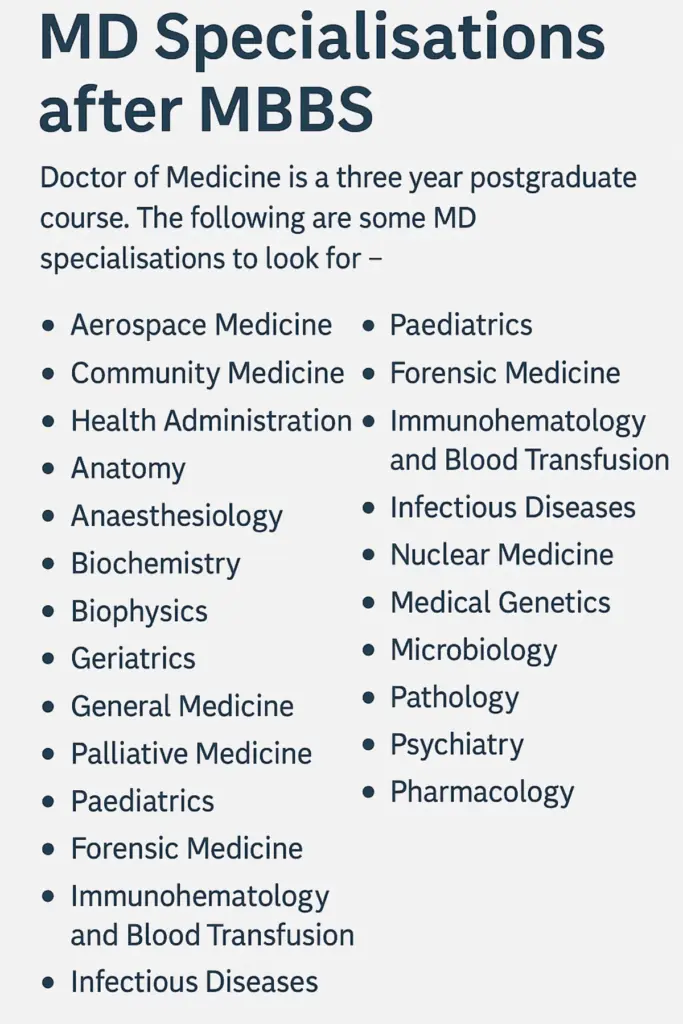
MS Specialisation after MBBS: Surgical
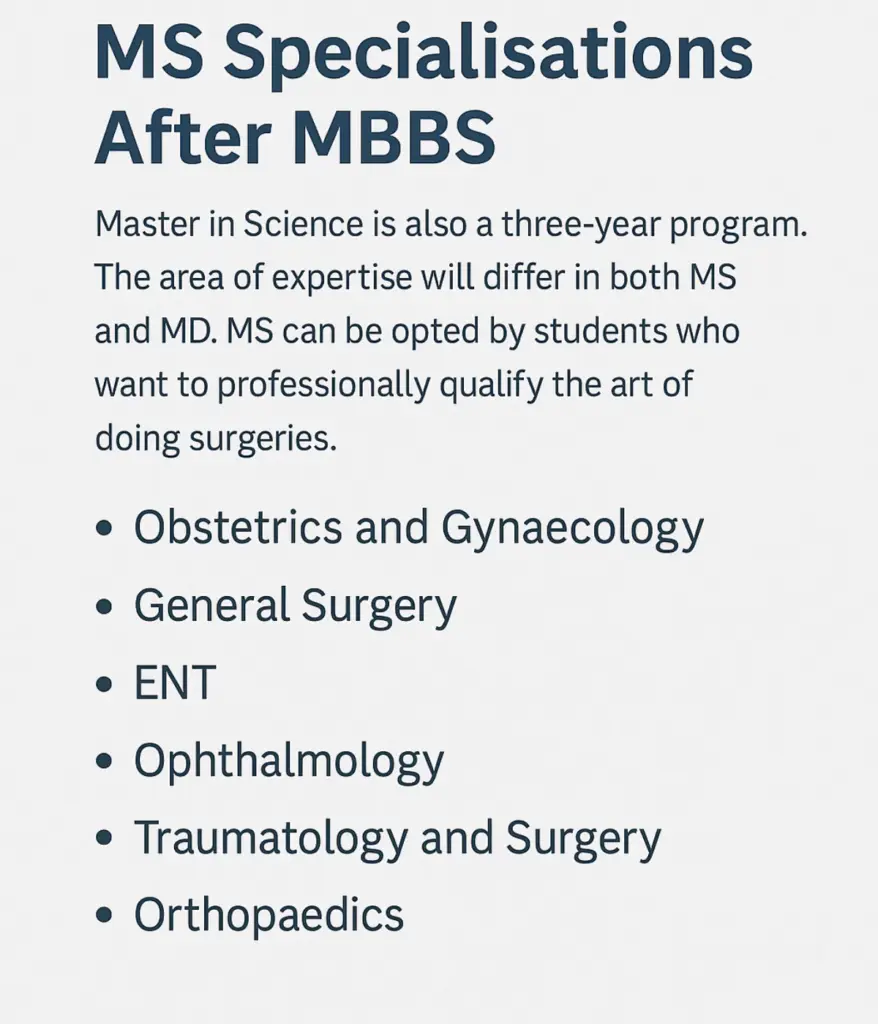
Specialisation after MBBS: Diploma DNB CET
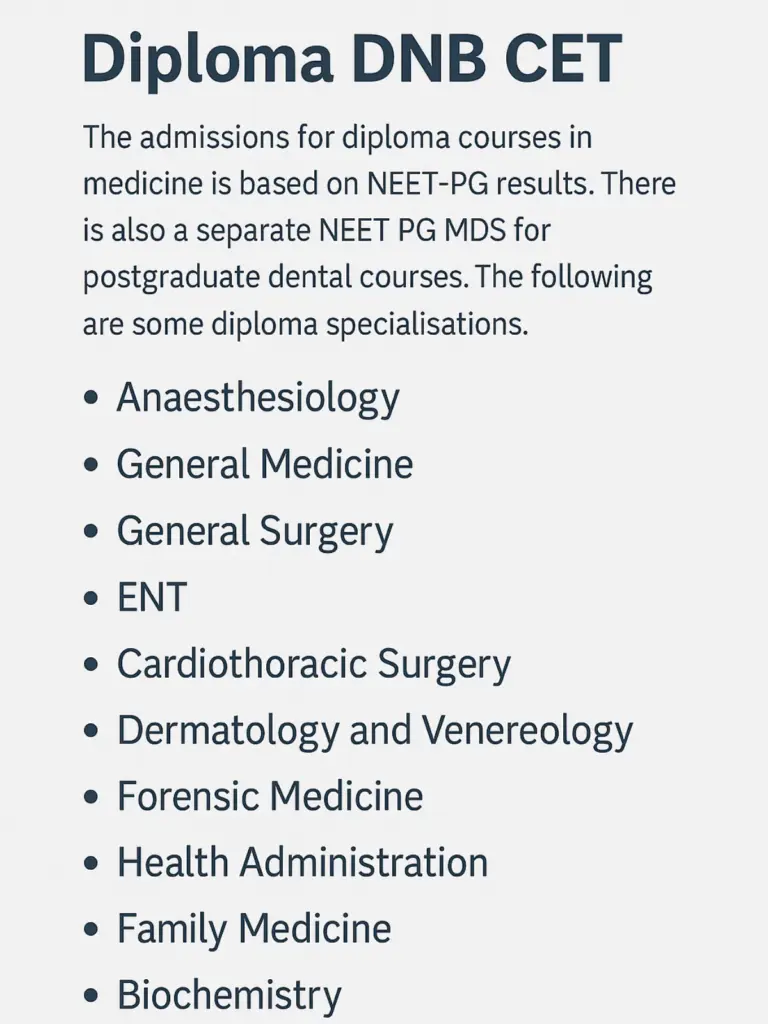
Specialisation after MBBS: Diploma DNB PDCET
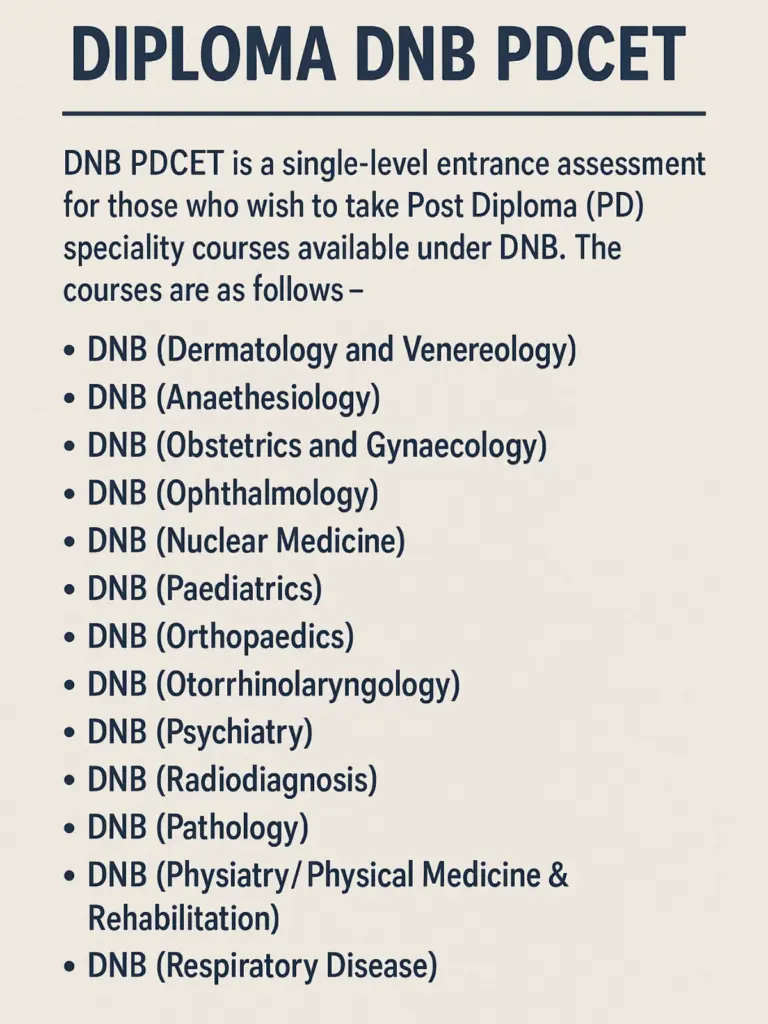
Upcoming & Niche Specialisations
In addition to the traditional specialisations, new-age medical fields are emerging in response to lifestyle changes, global health issues, and technological advancements:
- Endocrinology: Hormonal disorders like diabetes, thyroid problems, and obesity.
- Psychiatry: Mental health care is now more relevant due to increasing stress, anxiety, and depression in society.
- Emergency Medicine: Critical care and trauma management in emergency departments.
- Geriatrics: Medical care for the elderly, focusing on ageing-related diseases.
- Sports Medicine: Injury prevention, diagnosis, and treatment for athletes and fitness enthusiasts.
- Palliative Care: Holistic management of terminal illnesses with a focus on pain relief and quality of life.
How to Pursue a Medical Specialisation
After MBBS, the usual pathway to a specialisation is through postgraduate medical entrance exams like:
- NEET PG
- INICET (AIIMS, JIPMER, PGIMER)
- DNB (Diplomate of National Board)
- FMGE + PG for foreign medical graduates
Upon selection, you enroll in an MD (Doctor of Medicine), MS (Master of Surgery), or DNB course depending on your chosen field. Most PG programs are 3 years long, combining clinical training with theoretical learning.
Career Scope After Specialisation
Medical specialists have diverse and lucrative career paths:
- Government Hospitals & AIIMS
- Private Hospitals (e.g., Apollo, Fortis, Medanta)
- Self-owned clinics or speciality centers
- Academia and research institutions
- Telemedicine and health tech startups
- NGOs, international health organisations (WHO, MSF)
Moreover, specialisation can also open global doors, especially in countries like the USA, UK, Canada, and Australia, where qualified specialists are in high demand.
Choosing Your Specialisation
Choosing a specialisation is both a personal and strategic decision. Ask yourself:
- What subjects do you love the most?
- Do you enjoy clinical interaction, surgery, diagnostics, or lab work?
- Are you okay with high-pressure environments like emergency medicine?
- Would you prefer long-term patient care (like psychiatry) or procedural work (like surgery)?
Remember, specialisation is not just about prestige or salary. It’s about where your passion lies, because medicine is a lifelong journey of service, learning, and evolution.
Ready to dive into your future specialisation?
Whether it’s saving lives as a cardiologist or supporting mothers as an OB-GYN, your choice will shape your impact on the world. With the right planning and financial support, your journey from MBBS to expert specialist is within reach.

